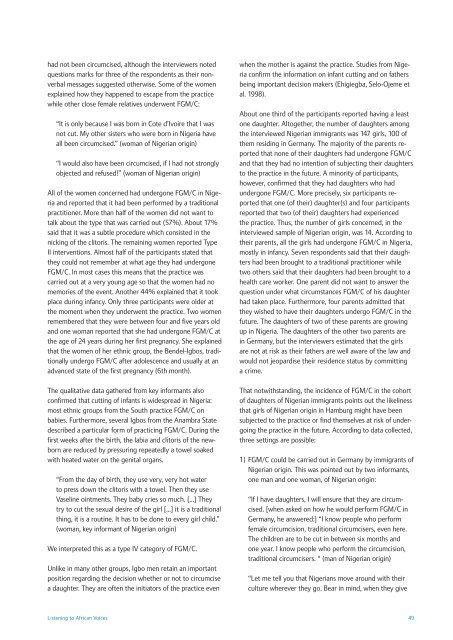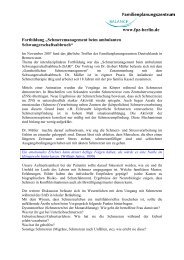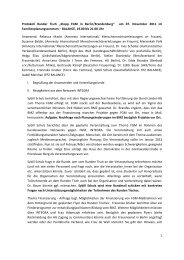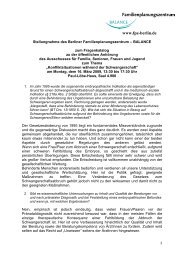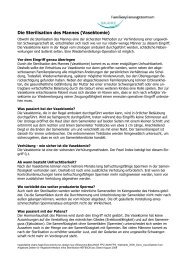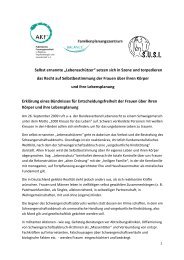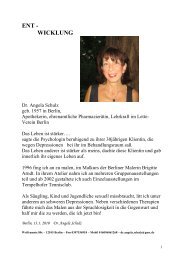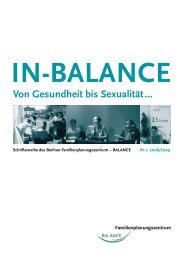Listening to African Voices - FPZ
Listening to African Voices - FPZ
Listening to African Voices - FPZ
You also want an ePaper? Increase the reach of your titles
YUMPU automatically turns print PDFs into web optimized ePapers that Google loves.
had not been circumcised, although the interviewers notedquestions marks for three of the respondents as their nonverbalmessages suggested otherwise. Some of the womenexplained how they happened <strong>to</strong> escape from the practicewhile other close female relatives underwent FGM/C:“It is only because I was born in Cote d’Ivoire that I wasnot cut. My other sisters who were born in Nigeria haveall been circumcised.” (woman of Nigerian origin)“I would also have been circumcised, if I had not stronglyobjected and refused!” (woman of Nigerian origin)All of the women concerned had undergone FGM/C in Nigeriaand reported that it had been performed by a traditionalpractitioner. More than half of the women did not want <strong>to</strong>talk about the type that was carried out (57%). About 17%said that it was a subtle procedure which consisted in thenicking of the cli<strong>to</strong>ris. The remaining women reported TypeII interventions. Almost half of the participants stated thatthey could not remember at what age they had undergoneFGM/C. In most cases this means that the practice wascarried out at a very young age so that the women had nomemories of the event. Another 44% explained that it <strong>to</strong>okplace during infancy. Only three participants were older atthe moment when they underwent the practice. Two womenremembered that they were between four and five years oldand one woman reported that she had undergone FGM/C atthe age of 24 years during her first pregnancy. She explainedthat the women of her ethnic group, the Bendel-Igbos, traditionallyundergo FGM/C after adolescence and usually at anadvanced state of the first pregnancy (6th month).The qualitative data gathered from key informants alsoconfirmed that cutting of infants is widespread in Nigeria:most ethnic groups from the South practice FGM/C onbabies. Furthermore, several Igbos from the Anambra Statedescribed a particular form of practicing FGM/C. During thefirst weeks after the birth, the labia and cli<strong>to</strong>ris of the newbornare reduced by pressuring repeatedly a <strong>to</strong>wel soakedwith heated water on the genital organs.“From the day of birth, they use very, very hot water<strong>to</strong> press down the cli<strong>to</strong>ris with a <strong>to</strong>wel. Then they useVaseline ointments. They baby cries so much. […] Theytry <strong>to</strong> cut the sexual desire of the girl […] it is a traditionalthing, it is a routine. It has <strong>to</strong> be done <strong>to</strong> every girl child.”(woman, key informant of Nigerian origin)We interpreted this as a type IV category of FGM/C.Unlike in many other groups, Igbo men retain an importantposition regarding the decision whether or not <strong>to</strong> circumcisea daughter. They are often the initia<strong>to</strong>rs of the practice evenwhen the mother is against the practice. Studies from Nigeriaconfirm the information on infant cutting and on fathersbeing important decision makers (Ehigiegba, Selo-Ojeme etal. 1998).About one third of the participants reported having a leas<strong>to</strong>ne daughter. Al<strong>to</strong>gether, the number of daughters amongthe interviewed Nigerian immigrants was 147 girls, 100 ofthem residing in Germany. The majority of the parents reportedthat none of their daughters had undergone FGM/Cand that they had no intention of subjecting their daughters<strong>to</strong> the practice in the future. A minority of participants,however, confi rmed that they had daughters who hadundergone FGM/C. More precisely, six participants reportedthat one (of their) daughter(s) and four participantsreported that two (of their) daughters had experiencedthe practice. Thus, the number of girls concerned, in theinterviewed sample of Nigerian origin, was 14. According <strong>to</strong>their parents, all the girls had undergone FGM/C in Nigeria,mostly in infancy. Seven respondents said that their daughtershad been brought <strong>to</strong> a traditional practitioner whiletwo others said that their daughters had been brought <strong>to</strong> ahealth care worker. One parent did not want <strong>to</strong> answer thequestion under what circumstances FGM/C of his daughterhad taken place. Furthermore, four parents admitted thatthey wished <strong>to</strong> have their daughters undergo FGM/C in thefuture. The daughters of two of these parents are growingup in Nigeria. The daughters of the other two parents arein Germany, but the interviewers estimated that the girlsare not at risk as their fathers are well aware of the law andwould not jeopardise their residence status by committinga crime.That notwithstanding, the incidence of FGM/C in the cohor<strong>to</strong>f daughters of Nigerian immigrants points out the likelinessthat girls of Nigerian origin in Hamburg might have beensubjected <strong>to</strong> the practice or find themselves at risk of undergoingthe practice in the future. According <strong>to</strong> data collected,three settings are possible:1) FGM/C could be carried out in Germany by immigrants ofNigerian origin. This was pointed out by two informants,one man and one woman, of Nigerian origin:“If I have daughters, I will ensure that they are circumcised.[when asked on how he would perform FGM/C inGermany, he answered:] “I know people who performfemale circumcision, traditional circumcisers, even here.The children are <strong>to</strong> be cut in between six months andone year. I know people who perform the circumcision,traditional circumcisers. “ (man of Nigerian origin)“Let me tell you that Nigerians move around with theirculture wherever they go. Bear in mind, when they give<strong>Listening</strong> <strong>to</strong> <strong>African</strong> <strong>Voices</strong> 49


